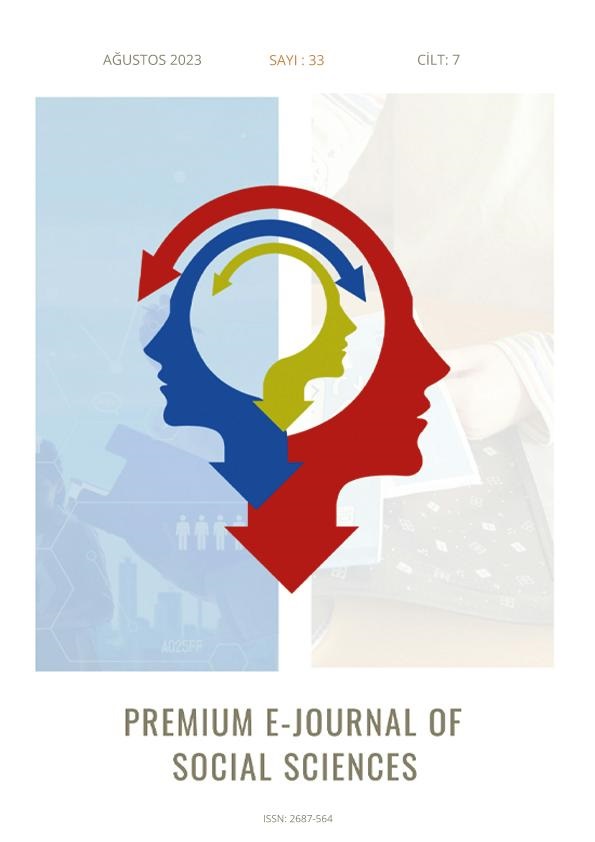Teachers' Quality of Work-Life Levels
DOI:
https://doi.org/10.5281/zenodo.8308442Keywords:
Quality of work life, quality, balance, teacher, satisfactionAbstract
This study, in which teachers' work-life quality levels were investigated, was conducted in a survey model. In the 2022-2023 academic year, 297 teachers working in Denizli metropolitan districts were reached with an easily accessible sample. Data were collected online in the research. Since the data showed normal distribution, parametric tests were performed in the analyses. Regarding the teachers' work-life quality levels, the highest level is "Very high". The lowest level is “Intermediate” while “The career opportunities in my job are satisfying to me.” in the article. The sub-dimensions of teachers' work-life quality levels are at the "High" level in all dimensions. However, while the highest level is in the dimension of job-career satisfaction, the lowest level is in the dimension of General well-being. The general quality of work life of teachers is at a high level. According to the findings, teachers' work-life quality levels were measured at a high level in all dimensions and in general. The work-life quality of teachers did not differ according to their demographic characteristics, gender, education level, career status, and the number of teachers at school, but differed according to the variables of work-life quality assessment, marital status, and degree of satisfaction with their job. According to the work-life quality assessment, teachers' work-life quality levels in all dimensions and overall work-life quality are between those who see the work-life quality as above average and those who see it as very low, in favor of those who see it as above average, between those who evaluate it as medium and those who evaluate it as very low, and in favor of those who evaluate it as moderate. got high. Compared to their marital status, teachers' work-life quality levels, general well-being, working conditions, and general work-life quality are higher in favor of married teachers. It has been determined that the quality of work life of teachers is high in all dimensions according to the level of satisfaction with the quality of work life, according to the level of satisfaction with the quality of work life, and in general, according to the level of satisfaction with the quality of work life. It has been suggested to carry out studies that will increase the quality of the work life of teachers.
Downloads
References
Aydın, A. ve Şentürk, İ. (2007). “Eğitimde Toplam Kalite Yönetiminin Uygulanması (İlköğretim Okulları Örneği)”. Manas Sosyal Bilimler Dergisi, 9 (17), 1-19.
Bursalıoğlu, Z. (2019). Okul Yönetiminde Yeni Yapı ve Davranış. Pegem Akademi Yayıncılık.
Bursalıoğlu, Z. (2020). Eğitim Yönetiminde Teori ve Uygulama. Pegem Akademi Yayıncılık.
Çetin, C. ve Özcan, E. D. (2013). İnsan Kaynakları Yönetimi. Beta Yayıncılık.
Erdem, M. (2010). Öğretmen Algılarına Göre Liselerde İş Yaşamı Kalitesi ve Örgütsel Bağlılıkla İlişkisi. Kurum ve Uygulamada Eğitim Yönetimi, 16 (4), 511-536.
Erdem, O. (2009). Örgütsel Vatandaşlık Davranışlarının Örgüt Kültürüyle İlişkisi ve Türk Telekomünikasyon AŞ Üzerinde Bir Araştırma [Yayınlanmamış Yükseklisans Tezi]. Marmara Üniversitesi. Sosyal Bilimler Enstitüsü.
Fontinha, R., Van Laar, D., & Easton, S. (2018). Quality Of Working Life Of Academics And Researchers İn The UK, The Roles Of Contract Type, Tenure And University Ranking. Studies İn Higher Education, 43(4), 786-806. https://doi.org/10.1080/03075079.2016.1203890
Gaurav, K. (2012). Quality Of Work Life (Qwl). Employee Satisfaction. Munich: Grin Verlag.
Huzzard, T. (2003). The Convergence Of The Quality Of Working Life And Competitiveness, A Current Swedish Literature Review. Arbetsliv I Omvandling, (9), 1-119.
İlğan, A., Erdem, M., Taşdan, M. ve Memduhoğlu, H. B. (2008). Örgütsel Gelişim Aracıları Olarak Toplam Kalite Yönetimi ile Stratejik Yönetim ve Planlama Yaklaşımları. Çukurova Üniversitesi Eğitim Fakültesi Dergisi, 35(3), 72-92.
Jayakumar A. & Kalaiselvi K. (2012). “Quality of Work Life-An Overview.” International Journal of Marketing, Financial Services & Management Research, 1(10), 140-151.
Kalaycı, Ş. (2016). SPSS uygulamalı çok değişkenli istatistik teknikleri. Asil
Karasar, N. (2012). Bilimsel araştırma yöntemi (22. baskı). Nobel Akademi Yayıncılık.
Pruijt, H. (2000). Performance and quality of working life. Journal of Organizational Change Management, 13(4), 389-400. https://doi.org/10.1108/09534810010339077
Qudah, S., Davies, J., & Deakin, R. (2018). Can We Get More Satisfaction? Improving Quality Of Working Life Survey Results İn UK Universities. Perspectives, Policy And Practice İn Higher Education. https://doi.org/10.1080/13603108.2018.1534758
Salehi, M., Seyyed, F., & Farhangdoust, S. (2020). The İmpact Of Personal Characteristics, Quality Of Working Life And Psychological Well-Being On Job Burnout Among Iranian External Auditors. International Journal Of Organization Theory & Behavior. https://doi.org/10.1108/IJOTB-09-2018-0104
Sipahioğlu, M., Toprak, E., Coşkun, B. ve Güçlü, M. (2020). Okul Yönetiminde Algılanan Okul Yaşam Kalitesinin Sınıflanması Üzerine Bir Araştırma. Uluslararası Sosyal Araştırmalar Dergisi, 13(70),: 822-834.
Yalçın, S. & Akan, D., (2016). Okul Yöneticilerinin Liderlik Stilleri ile Öğretmenlerin İş Yaşam Kalitesi ve Örgütsel Bağlılıkları Arasındaki İlişkinin İncelenmesi. Elektronik Sosyal Bilimler Dergisi, 1138-1156.
Yücetürk, E. E., (2005). Türkiye’de İş Yaşam Kalitesini ve Verimliliği Azaltan Gizli Bir Sendrom: Yıldırma (Mobing). İktisat, İşletme ve Finans Dergisi, 97-108.
Yüzügüllü, D. A., Aytaç, N., & Akbaba, M. (2018). Bir Üniversite Hastanesinin Yoğun Bakım Ünitesi Hemşirelerinde Yaşam Kalitesi, İş Kazaları ve Vardiyalı Çalışmanın Etkileri. Sakarya Tıp Dergisi, 8(1), 99-107.
Zeng, X., Chaiear, N., Klainin, P., Khiewyoo, J., Koh, D., Hien, P. W. H., & Lee, S. Y. (2011). Work-Related Quality Of Life Scale Among Singaporean Nurses. Asian Biomedicine, 5(4), 467-474. https://doi.org/10.5372/1905-7415.0504.061
Downloads
Published
How to Cite
Issue
Section
License
Copyright (c) 2023 Premium e-Journal of Social Science (PEJOSS)

This work is licensed under a Creative Commons Attribution 4.0 International License.


